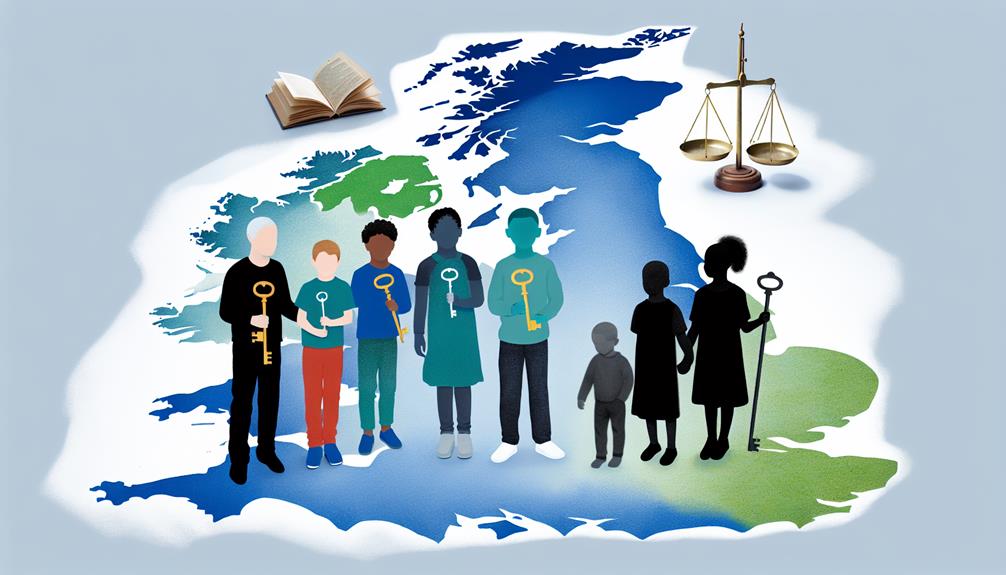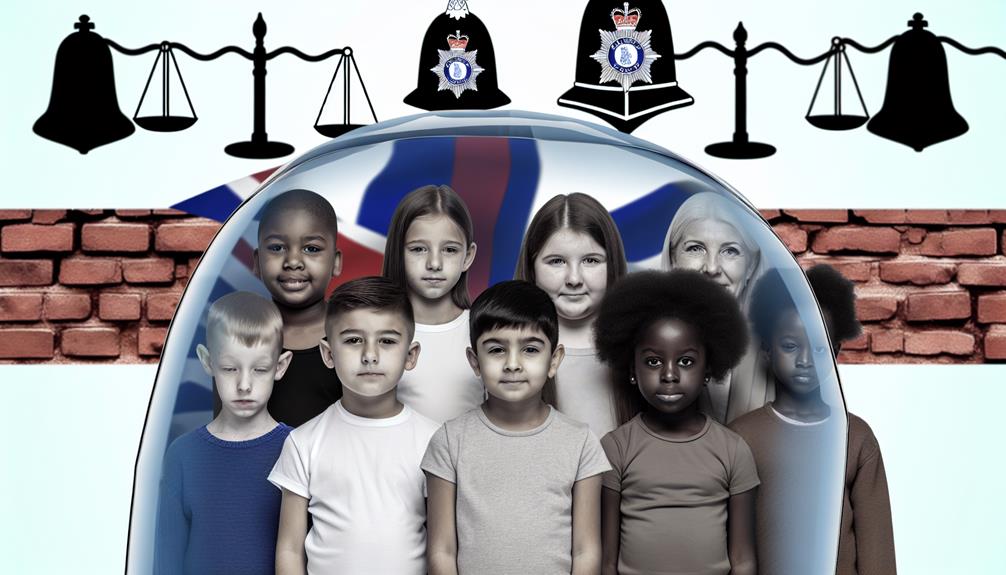As a foster child in the UK, you're protected by key rights. You've a right to safety, regular schooling, and healthcare services, including dental care, nutrition guidance, and mental health support. Your rights also guarantee you can communicate and maintain relationships with your family, in a manner that respects your privacy. Importantly, you're encouraged to speak up and seek support if needed. These rights exist to empower you. Further insight into these rights can provide useful understanding for how to make the most of your foster care experience.
Key Takeaways
- Foster children in the UK have a legal right to their welfare prioritized under the Children Act 1989.
- They are entitled to regular school attendance, academic progression, and additional educational support.
- Foster children have access to healthcare provisions, including dental care, nutrition guidance, preventive care, and mental health support.
- They have the right to communicate with and maintain relationships with their family members, with the support of social services.
- Foster children are encouraged to speak up for their rights and seek support when necessary, emphasizing the importance of their voice.
Understanding the UK Foster Care System

To truly grasp the rights of foster children in the UK, it's crucial that you first understand the nuances of the UK Foster Care System. You'll find that the system, while designed to protect and support, isn't without its deficiencies. It's these system deficiencies that often compromise the rights and wellbeing of the foster children.
One major issue is foster parent recruitment. There's a pressing need for more foster parents, yet recruitment efforts often fall short. Why? Potential foster parents are deterred by the lack of support and training, leading to a shortage of suitable homes for these vulnerable children.
Understanding the system's shortcomings is only half the battle. It's also essential to comprehend how these deficiencies impact the children within the system. When you're aware of the issues, you're better equipped to advocate for improvements and changes.
In essence, to advocate effectively for foster children's rights, you need to understand the system they're in. Knowledge about the system deficiencies and foster parent recruitment issues can help you contribute to meaningful changes and uphold the rights of these children. It's a challenging task, but one that can have a profound impact on the lives of these children.
Legal Framework Governing Foster Children
Let's explore the legal framework that governs foster care in the UK, as it plays a pivotal role in defending and upholding the rights of foster children. This legal structure is crucial in guaranteeing that the best interests of children in care are always prioritised, while also facilitating the involvement of social services and managing adoption proceedings.
Here are four key components of this framework:
- The Children Act 1989: This legislation forms the backbone of policies relating to children's welfare, emphasizing that a child's best interests should always be the paramount consideration.
- Social Services Involvement: Social services play a critical role in foster care, from the initial assessment to ongoing support and monitoring. Their involvement ensures that children's needs are met and rights safeguarded.
- Adoption Proceedings: The Adoption and Children Act 2002 governs adoption, focusing on the child's welfare throughout the process. It also sets out the rights and responsibilities of all parties involved.
- Rights of Foster Children: The law guarantees foster children specific rights, such as the right to be heard and involved in decisions impacting their lives.
Understanding this framework is key to ensuring you're equipped to navigate the complexities of foster care in the UK.
Right to Protection and Safety

As a foster child in the UK, you have a fundamental right to protection and safety, and it's vital to understand how this is upheld by law. Protective legislation updates are continuously enforced to guarantee your wellbeing, with the most recent ones focusing more on digital safety.
In this age of technology, online safety measures have been integrated into your protective rights. It's important you're safeguarded from online bullying, exploitation, and other potential digital threats. The UK's legislative standards require all foster homes and agencies to implement strict online safety protocols. From setting up secure Wi-Fi networks to regulating the use of digital devices, every effort is made to ensure your online experience is safe and positive.
Your physical safety is also paramount. Legislation dictates that all foster homes must be secure, comfortable, and conducive to your growth. Regular inspections are conducted to guarantee compliance with these standards.
While these laws are designed to protect you, it's important that you familiarise yourself with them. Understanding your rights to protection and safety can empower you in your foster journey, ensuring you fully benefit from the care and support available.
Educational Rights of Foster Children
Understanding the education system can be complex, but you should be aware that as a foster child in the UK, you have specific rights to guarantee you receive a quality education. These rights guarantee your academic progression and open opportunities for vocational training.
Let's explore the specifics:
- Right to Regular School Attendance: You're entitled to attend school regularly, just like any other child. Unjustified absences should be rare and reason-based.
- Right to Academic Progression: You have the right to advance academically at a pace that suits your abilities and potential. Tailored support should be provided to aid your progression.
- Right to Vocational Training: If you're more inclined towards practical skills, you're entitled to vocational training. This can provide a pathway to fulfilling and rewarding employment.
- Right to Additional Support: If you're struggling academically, have special educational needs, or English isn't your first language, you can access extra support.
Don't let your circumstances hinder your educational journey. Your rights are there to support and guide you. Embrace them, for they're your stepping-stones to a brighter future.
Healthcare Provisions for Foster Children

It's important to understand that the healthcare needs of foster children extend beyond routine doctor's visits. As a carer, you'll be responsible for helping them access all necessary medical services, including mental health support.
The UK system has provisions in place for this, which we'll explore next.
Accessing Medical Services
Traversing the healthcare system can be intimidating, but for foster children in the UK, there are specific provisions in place to guarantee they receive essential medical services. This includes:
- Dental Care Access: Foster children have the right to regular dental check-ups and treatments.
- Nutrition Guidance: They're entitled to advice and education on maintaining a healthy diet.
- Preventive Care: Vaccinations and regular check-ups are provided to prevent and detect health problems early.
- Specialist Services: If a child has specific health needs, they've the right to access specialist medical services.
Mental Health Support
Beyond the physical health services, foster children in the UK also have the right to receive thorough mental health support. It's important to acknowledge the potential psychological impact of being in foster care, and the UK system recognizes this. Various therapeutic interventions are available, designed to mitigate trauma and promote healing.
Counselling, cognitive behavioural therapy and play therapy are just a few examples. These interventions help children process their experiences, manage emotions and cultivate resilience. Resilience building is a key focus, enabling youngsters to withstand future challenges with greater fortitude.
Right to Family Contact and Visitation
In the maze of foster care, you have a fundamental right to maintain contact with your biological family and receive regular visits. This right extends to all children, regardless of their situation. There are visitation logistics in place to guarantee this right is upheld. These logistics include safe and comfortable settings for your visits, flexible scheduling to accommodate your and your family's needs, and professional guidance to help the visits go smoothly.
Your right to family contact and visitation includes:
- Regular and consistent visits with your biological family, which can be supervised or unsupervised based on your circumstances.
- The ability to have phone calls, letters, emails, or other forms of direct communication with your family.
- The right to have your family involved in decisions about your care, as long as it's in your best interest.
- The right to have privacy in your communication with your family, within reason.
Family communication is an important part of your wellbeing. If you ever feel like your rights aren't being respected, it's important to speak up. Remember, you have a voice and it deserves to be heard.
Frequently Asked Questions
What Are the Emotional Support Systems Available for Foster Children in the Uk?
In the UK, you've got access to therapeutic interventions and mental health resources. They're designed specifically to provide emotional support, helping you navigate through your experiences as a foster child effectively and healthily.
How Can Foster Children Transition Into Adulthood and Independent Living?
You can shift into adulthood smoothly by utilizing career guidance services and exploring various housing options. These resources are designed to equip you with the skills and knowledge for independent living.
What Resources Are Available for Foster Children Who Identify as Lgbtq+?
You'll find LGBTQ+ groups like Stonewall offering resources for identity acceptance and representation. They provide support, understanding, and guidance, ensuring you don't feel alone during your journey as an LGBTQ+ foster child in the UK.
How Do Foster Children Access Financial Support or Benefits, if Any?
You're eligible for certain benefits as a foster child. It's essential you understand financial literacy to navigate these options. Engage with your social worker or use online resources to learn about your entitlements.
What Are the Rights of Foster Children in the Context of Religious and Cultural Identity?
In the UK, foster kids have a right to maintain their cultural and religious identity. You're allowed to practice your religion and celebrate your culture. It's like keeping your unique fingerprint in a diverse world.
Conclusion
So, you've uncovered the landscape of foster children's rights in the UK. Remember, every child's safety, health, education, and ties to their biological family matter.
Keep in mind, it's not just about knowing these rights – it's about ensuring they're upheld. What role will you play in this narrative? The next step is yours, and it could make a world of difference in a foster child's life.
After all, their story is still being written.




